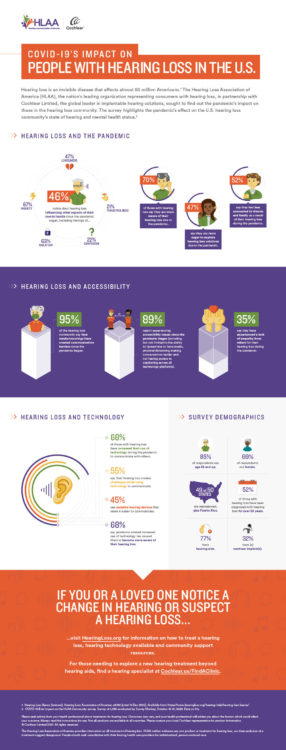Chances are you don’t think about your ability to hear many different sounds at once often. However, if you’re a deaf or hearing-impaired person, keeping track of the nuances of conversation and understanding people while trying to communicate with them can be really difficult.
At the start of the COVID-19 pandemic, the Centers for Disease Control and Prevention (CDC) recommended the wearing of face masks – a piece of filtered fabric that hangs over the nose and mouth to prevent the spread of viruses. In general, mask wearing can reduce infection rates by an average of 47%, according to a National Academy of Sciences research report.
There is a challenge, however. Many individuals in the deaf community are finding masks to be significant barriers to conversation.
In a Hearing Loss Association of America (HLAA) survey of approximately 1,400 deaf or hearing-impaired individuals, 95% reported that face masks are significantly impacting their ability to communicate with others, and have exacerbated emotions of isolation, loneliness and anxiety.
Whether you realize it or not, we all, to some degree, read lips to help us understand one another and comprehend the tone behind the words. When a hearing impaired or deaf individual like myself can’t read lips because of a face covering, communication becomes even more complicated as it’s difficult to determine the consonants and emotions behind whatever the individual is trying to express.
Hearing is one thing, but understanding is another.

Isolation, loneliness and grief have been constant companions for many during this pandemic for a variety of reasons. Whether you have or haven’t lost a friend or family member to this ravaging disease, a collective sense of grief can be felt by many for a variety of reasons. While it’s important to have a community of loved ones to undergird us during unprecedented times like these, maintaining relationships can be difficult when the cards are stacked against communication.
Professor and bilateral cochlear implant recipient Michael Walsh, Ph.D. said that he didn’t realize until COVID-19 struck how much he would struggle to understand without being able to read lips.
“Everybody who [experiences] any kind of hearing loss becomes good at reading lips… I didn’t realize how much I read lips until we had to start to wear face masks and my ability to understand speech was challenged,” Walsh said.
Because communication has proved so difficult, many individuals surveyed said that they have become even more aware of their hearing loss as a result of the pandemic restrictions.
Executive director of HLAA Barbara Kelley said that the survey has continued to prove how accessibility accommodations like closed captioning are so critical.
“The survey results reinforce the overwhelming challenge with masks for the hearing loss community, and many requested that the larger population invest in safe, clear face masks… I hope coming out of this pandemic we will see people continue to take their hearing loss seriously and treat it appropriately, as well as continue to see greater standards on accessibility to help those with hearing loss,” Kelley said.
If you suspect that you are struggling with hearing loss, please consider visiting a hearing specialist to find out your needs. Your needs are important.
Getty image by JohnAlexandr.

